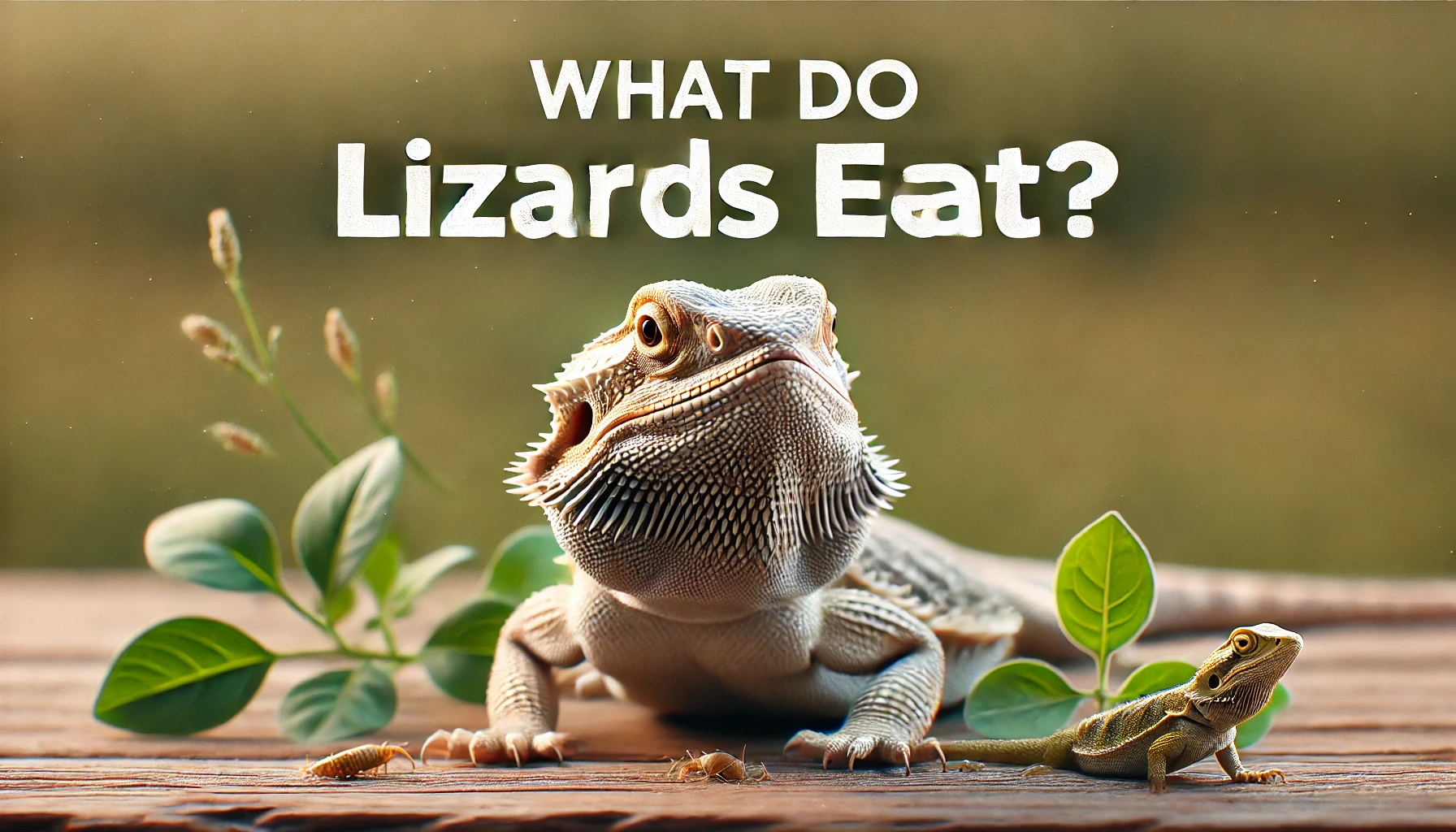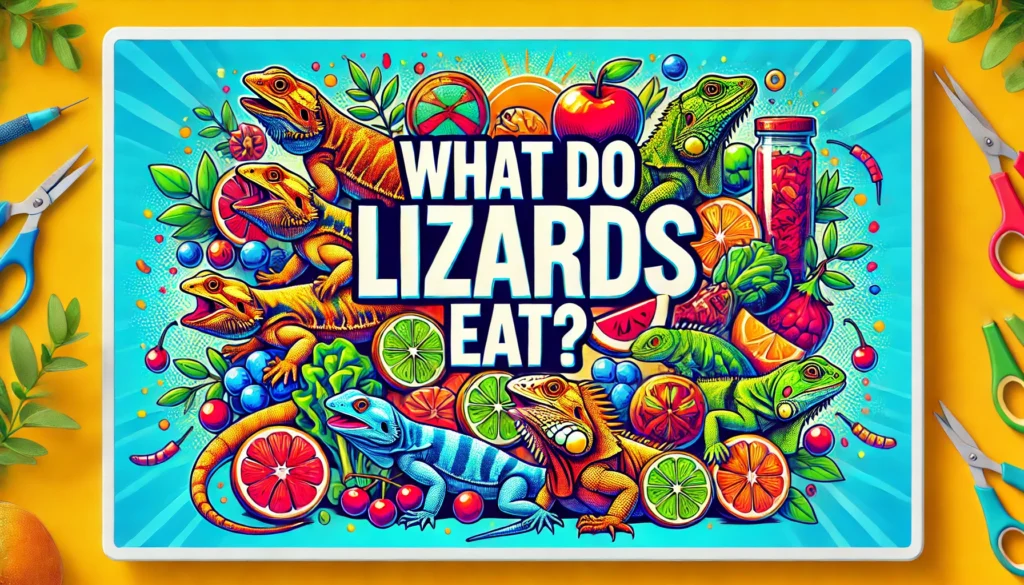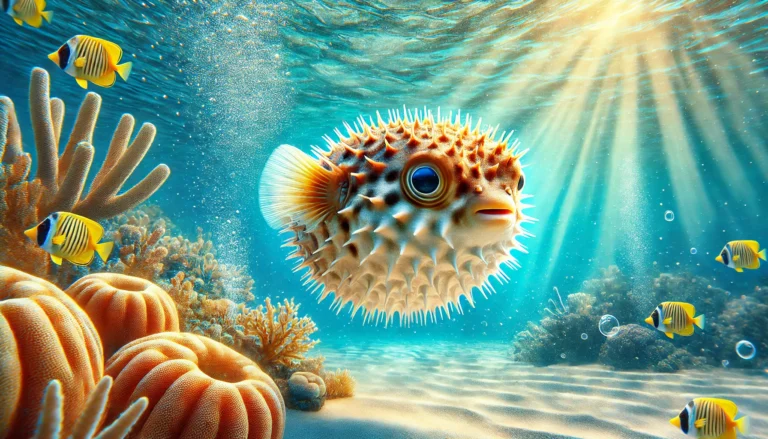What Do Lizards Eat? Amazing fruits and Vegetable Diet Guide

Introduction: Understanding What Do Lizards Eat
Lizards are an incredibly diverse group of reptiles, varying greatly in size, habitat, and dietary preferences. While some species thrive on a carnivorous diet, others require a mix of animal and plant-based foods, and some are primarily herbivorous. For pet owners, knowing what lizards eat is crucial for providing a balanced and nutritious diet. This guide focuses on ten fruits and vegetables that are suitable for lizards, especially those species that benefit from or require a diet inclusive of plant matter.

The Importance of Fruits and Vegetables for Lizards
Most people are search about the What Do Lizards Eat? Incorporating fruits and vegetables into a lizard’s diet is essential for those that are omnivorous or herbivorous. These foods provide vital nutrients that might not be sufficiently supplied by insects or meat alone, such as vitamins, minerals, and hydration. Understanding what lizards eat in terms of fruits and vegetables can help prevent nutritional deficiencies and support overall health.
1. Bell Peppers: Vibrant and Vitamin-Rich
Nutritional Benefits: Bell peppers are rich in vitamins A and C, which are essential for immune health and vision. They also contain antioxidants that help protect lizard cells from damage.
Best For: Omnivorous lizards, such as bearded dragons and certain skinks.
How to Serve: Wash thoroughly, remove seeds, and cut into small pieces that are easy for your lizard to consume.
2. Carrots: Beta-Carotene Boosters
Nutritional Benefits: Carrots are loaded with beta-carotene, which the body converts into vitamin A, supporting good vision and immune function. They’re also a good source of fiber, which aids in digestion.
Best For: A variety of lizard species that are omnivorous, including bearded dragons.
How to Serve: Peel and finely grate or cook and mash to make them easier for your lizard to eat.
3. Squash: Soft and Nutrient-Dense
Nutritional Benefits: Squash is an excellent source of vitamins such as A, C, and B6, as well as magnesium and potassium, which help maintain healthy heart function and muscle activity.
Best For: Both herbivorous and omnivorous lizards can enjoy squash.
How to Serve: Cook to soften, remove any seeds, and cut into small, digestible pieces.
4. Kale: A Calcium-Rich Choice
Nutritional Benefits: Kale offers a wealth of nutrients, including high levels of vitamin K, calcium, and antioxidants, making it beneficial for bone health and overall vitality.
Best For: Herbivores and omnivores, but should be offered in moderation due to its oxalate content which can bind with calcium.
How to Serve: Finely chop and mix with other vegetables to create a balanced meal.
5. Sweet Potatoes: Fiber-Filled and Flavorful
Nutritional Benefits: Sweet potatoes are a fantastic source of dietary fiber, vitamins, and beta-carotene, providing energy and aiding in digestive health.
Best For: Suitable for most herbivorous and omnivorous lizards as part of a varied diet.
How to Serve: Thoroughly cooked and mashed or diced into small pieces, ensuring they are soft enough to eat.
6. Blueberries: Antioxidant Powerhouses
Nutritional Benefits: Known for their high antioxidant content, blueberries help reduce inflammation and support heart health. They are also rich in vitamin C and fiber.
Best For: Perfect as an occasional treat for omnivorous lizards.
How to Serve: Fresh, ensuring they are washed and halved if necessary to suit smaller lizards.
7. Apples: Hydrating and Heart-Healthy
Nutritional Benefits: Apples are a great source of hydration, fiber, and vitamins A and C. They help maintain digestive health and support immune function.
Best For: Omnivorous lizards, provided in moderation to avoid excess sugar.
How to Serve: Cored, peeled, and chopped into appropriate sizes to prevent choking hazards.
8. Pears: Gentle on the Stomach
Nutritional Benefits: Pears are another excellent source of hydration and are rich in fiber and vitamin C, which aids in digestion and boosts immunity.
Best For: A healthy addition for omnivorous lizards enjoying a diverse diet.
How to Serve: Prepare similarly to apples—peeled, cored, and cut into small pieces.
9. Watermelon: Perfect for Hydration
Nutritional Benefits: Watermelon is mostly water and is excellent for keeping lizards hydrated. It also provides vitamins A, B6, and C.
Best For: Ideal for all types of lizards, especially during hotter periods or in dry environments.
How to Serve: Remove seeds and rind, then cut into small, easy-to-eat strips or cubes.
10. Cucumber: Cool and Refreshing
Nutritional Benefits: Cucumbers are low in calories but high in water content, making them excellent for hydration. They also provide a small amount of vitamin K.
Best For: Most lizards, particularly beneficial in maintaining hydration.
How to Serve: Peeled, seeded (if necessary), and chopped into small pieces for ease of eating.
do you know?
Regular veterinary visits, a clean environment, and attentive care at home are key to managing your cat’s health. Remember, while occasional sneezing is normal, persistent sneezing warrants a deeper look by a professional to ensure your furry friend stays happy and healthy.
Conclusion: Customizing Your Lizard’s Diet
What lizards eat varies widely among species, making it crucial to tailor their diet to their specific needs. Fruits and vegetables can supplement a lizard’s diet with essential nutrients, but they should be introduced gradually and in moderation, depending on the lizard’s natural dietary habits. Always consult with a veterinarian specializing in reptiles to optimize your lizard’s diet for health and longevity, ensuring that you provide a balanced approach to their nutrition.
How do you feed backyard lizards?
Feeding backyard lizards involves providing foods that mimic their natural diet. This could include small insects like ants, flies, and small crickets, which are often readily available in their environment. Additionally, placing shallow dishes of water in your garden can help keep them hydrated. Avoid handling the lizards or trying to force-feed them, as they are best supported by maintaining a natural and safe habitat.
What is home food for lizards?
Home food for lizards generally consists of insects such as crickets, mealworms, and flies which can be purchased from pet stores. For herbivorous or omnivorous lizards, chopped fruits and vegetables like leafy greens, carrots, and apples can be offered. It’s important to tailor the diet to the specific type of lizard, as different species have varying dietary needs.
What lizards eat fruit?
Many omnivorous lizards enjoy fruit as part of their diet. Species such as bearded dragons, blue-tongued skinks, and iguanas can eat a variety of fruits including mangoes, melons, and berries. Fruit should be offered in moderation as a complement to a balanced diet, considering their overall nutritional needs and natural dietary preferences.
What is a lizard’s favorite food?
A lizard’s favorite food often depends on the species. Carnivorous lizards like geckos may prefer insects such as crickets or mealworms, while herbivorous species like iguanas favor leafy greens and certain fruits. Omnivorous lizards might show a particular fondness for a mix of both plant-based foods and proteins.
What does eat a lizard?
Lizards have many natural predators, including birds of prey, snakes, larger mammals, and even other lizards. Human habitation areas pose additional threats where domestic pets like cats and dogs can also become predators to lizards.
What can lizards not eat?
Lizards should not eat foods that are high in oxalates and phosphorus, such as spinach and avocado, as these can inhibit calcium absorption and lead to health problems. Additionally, onions, garlic, and chives are toxic to many animals, including lizards. Always avoid feeding lizards any processed foods intended for human consumption, which can be harmful to them.
What foods are toxic to lizards?
Certain plants and foods are toxic to lizards, including avocado, rhubarb leaves, and some citrus fruits, which should be avoided in their diets. Also, dairy products and any processed foods containing spices, flavorings, or preservatives are not suitable for lizards and can cause significant health issues.
What do lizards hate the most?
Lizards are generally repelled by strong, pungent odors such as garlic, onion, and hot pepper. Many commercial lizard repellents use these scents to deter lizards from entering homes and gardens. They also tend to avoid areas with few places to hide, such as open, clear spaces devoid of shelter like rocks, logs, or foliage.
Can a lizard bite you?
Yes, a lizard can bite you if it feels threatened or stressed. However, most common lizards such as geckos and anoles are small and unlikely to cause much harm. Larger lizards, like iguanas and monitor lizards, can deliver a more painful bite which can lead to more significant injury.
Can lizards hear you?
Lizards do have the ability to hear, although their hearing is not as developed as in mammals. They lack external ears but have sensitive eardrums which allow them to detect vibrations and low-frequency sounds, helping them to be aware of predators or other dangers.
Will lizards crawl in your bed?
While it’s uncommon for lizards to crawl into beds, it’s not impossible, especially in regions where houses commonly have these creatures inside. Lizards usually enter homes in search of food or to escape extreme weather conditions, and they might end up in a bed accidentally while exploring.
Do lizards come near humans while sleeping?
It is rare for lizards to intentionally come near humans while they are sleeping. Lizards generally avoid human contact and will only come close if there is an attraction such as warm spots or insect presence. They are naturally more afraid of humans and will typically keep their distance unless habituated or cornered.






